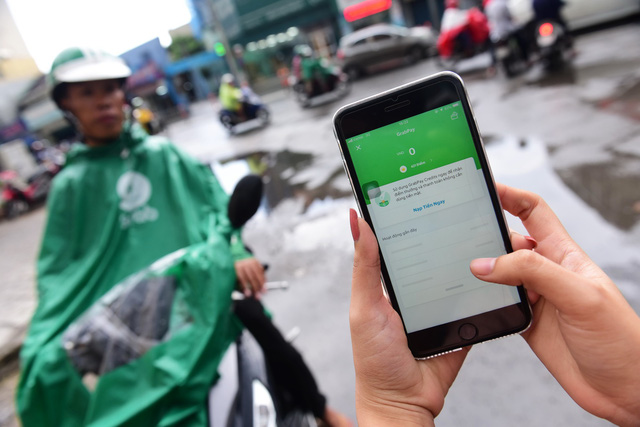Grab has made another announcement to address problems related to the abrupt change to its payment method that stirred up criticism from ride-hailing travelers.
At a meeting with the media on Thursday afternoon, Nguyen Tuan Anh, head of Grab Financial Group Vietnam, explained the reason prompting the ride-hailing firm to suddenly replace GrabPay and GrabPay Credits with GrabPay by Moca was to comply with a regulation set forth by the State Bank of Vietnam (SBV) by the imposed deadline of October 30.
GrabPay is the in-app mobile wallet that is linked with users' credit/debit cards while GrabPay Credits is a top-up prepaid account for those who do not want to share their card information with the app.
Currently, SBV regulates that an e-wallet must be linked with a payment account. GrabPay Credits did not meet this requirement.
Grab thus abandoned GrabPay Credits and GrabPay and introduced a new mobile wallet: GrabPay by Moca.
Accordingly, Grab users have to activate GrabPay by Moca, which now functions as the only other payment method besides cash.
However, the activation process was not easy and smooth for Grab’s customers.
Hundreds were unable to activate Moca accounts due to various reasons, including limitations according to which only ATM cards could be used on the platform.
Therefore, passengers had to stop using the service or to pay their rides in cash, which is subject to fewer promotions than GrabPay by Moca.
Grab users are also worried if and how their balance in GrabPay Credits accounts would be refunded.
Apology
According to director Anh, Grab had six months to prepare for this replacement, but it has faced several incidents during the time.
Those difficulties included the government’s requirement to swap all 11-digit mobile numbers for 10-digit formats in an effort to standardize the national telecommunications system, which affects a range of services registered with phone numbers such as emails, e-wallets, social media and mobile banking accounts.
The complication went further as it is required that mobile numbers provided to Grab were identical with the number registered at users’ banks, and customers had to also be using SMS banking services to be able to receive an OTP (one-time password) for activation from the bank.
“We apologize for any inconvenience caused during the transition,” Anh said during the meeting.
“If customers want to stop using the service, we will refund customers in two options of cash or promotional codes,” the Grab Financial Group director reassured.
The Grab representative guaranteed at the meeting that the new e-wallet will be free of error starting from the middle of this month and the firm will also offer several promotions as compensation for customers.
“After the complete conversion of the e-wallet, we will expand its utility to include payment for electricity, water, and phone top-up,” Anh said.
“From the information collected from the e-wallet service, we will learn users’ habits and try to provide postpaid expenses, with ride and food ordering in a month being paid at the end of that month.”
On the same day, Grab's country head in Vietnam Jerry Lim said at a symposium in Ho Chi Minh City that Grab wants to cooperate and become a technology partner with Vietnamese taxi firm Vinasun.
“We’re ready to support local businesses to develop and succeed together,” the executive said.
In early February, Vinasun took Grab to court, accusing the ride-hailing app of multiple violations in providing taxi services and causing serious losses for the taxi firm.
The verdict for the case was scheduled for Monday, but a court in Ho Chi Minh City announced on that day that the trial would resume on November 22 after more evidence is collected.
Like us on Facebook or follow us on Twitter to get the latest news about Vietnam!



















































